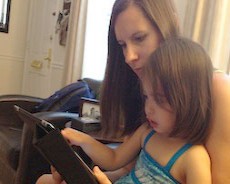April 2010
 Over a year ago, we began to notice something we couldn’t ignore. We noticed it in grocery stores and on the subway. We noticed it at shopping malls and in coffee shops. What we noticed was children – even very young children – playing on devices that weren’t specifically designed for them. The iPhone and iPod Touch revolution had hit the masses – and seemed to be including children as young as 3. While it felt counterintuitive that children would own iPhones, or even iPod Touches, anecdotally it became very common to observe the “pass-back” effect, where a parent or adult passes their own device to a child.
Over a year ago, we began to notice something we couldn’t ignore. We noticed it in grocery stores and on the subway. We noticed it at shopping malls and in coffee shops. What we noticed was children – even very young children – playing on devices that weren’t specifically designed for them. The iPhone and iPod Touch revolution had hit the masses – and seemed to be including children as young as 3. While it felt counterintuitive that children would own iPhones, or even iPod Touches, anecdotally it became very common to observe the “pass-back” effect, where a parent or adult passes their own device to a child.
Considering this phenomenon, it became important to consider the role that apps may play in children’s learning. To delve into this issue, we published a mini study called iLearn last fall. The short paper was a content analysis of the education section of the iTunes App Store, focusing on the 100 top-selling apps in this section. While the study was small, the implications were large, making it clear that apps are a significant new medium for providing educational content to children, both in terms of their availability and popularity.
Our most interesting find was that nearly half of the titles (47) specifically targeted children, with preschoolers being the largest single age category with 35 out of 100 titles. Even more telling, when we drilled down to the top 25 best-selling apps, 60% of them targeted toddler/preschool children — almost double the number that target adults! The analysis revealed apps available in a variety of school subjects, ranging from letter recognition to test prep. And, good news for parents, we found that children’s educational apps tend to cost less than apps for older children or adults, rarely going above $0.99.
It is now 6 months after publishing iLearn, and the app market for kids continues to explode. The iTunes store has opened a dedicated section of “Apps for Kids.” Major children’s entertainment companies have continued diving into this market en masse, and our very own Sesame Street now has numerous apps available for kids and parents alike. Apple has launched the iPad, which some say could be the game changer in children’s education, and as Warren Buckleitner recently documented, is undoubtedly a kid-friendly device. And, above all, we continue to notice the pass-back effect, as we observe children nationwide playing with iPhones and iPod Touches as though they were designed just for them. Who knows where this will all go? But we do know that the pass-back effect continues to march forward, and as it does we must continue to consider the role that apps may play in children’s learning.




